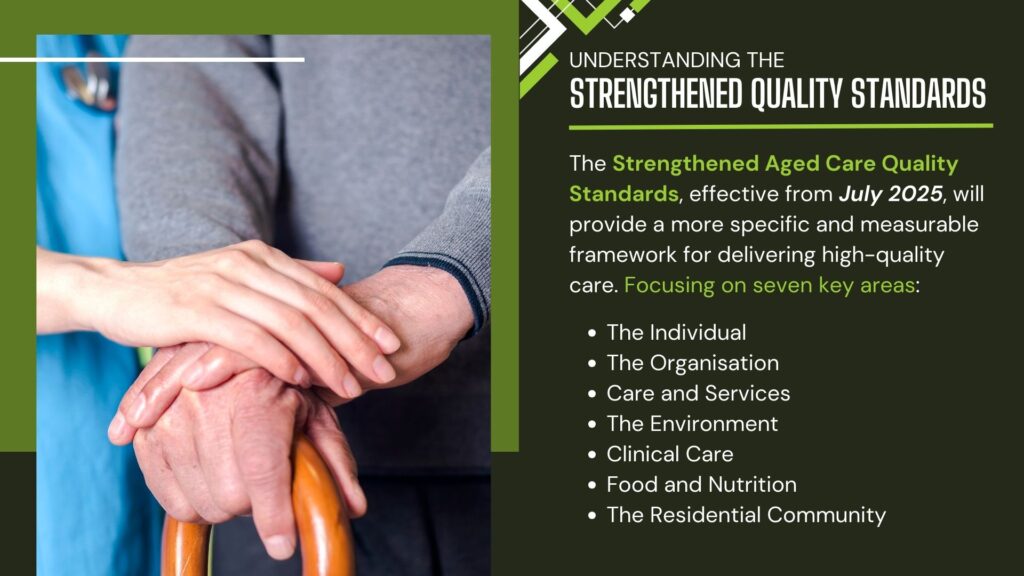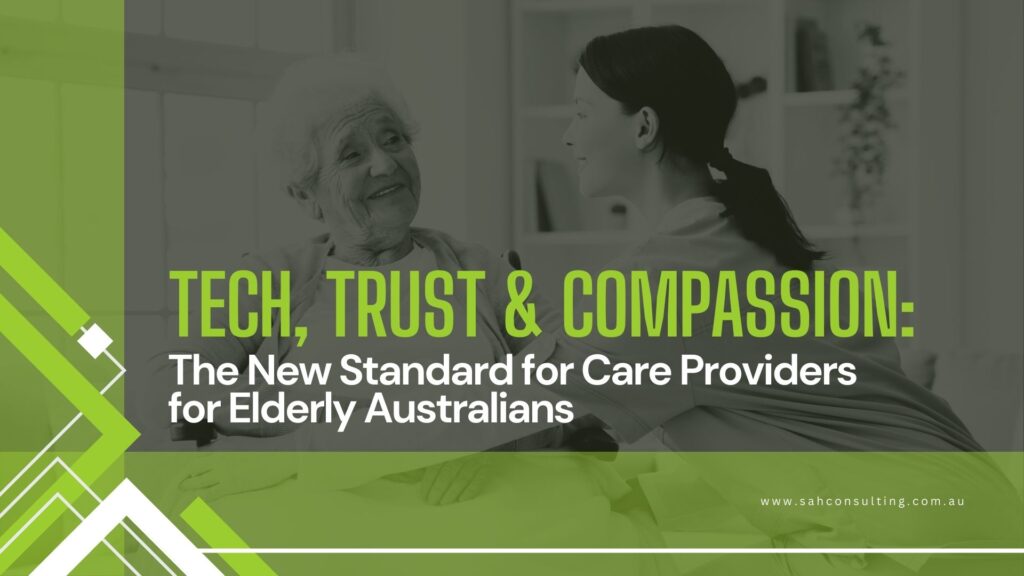The aged care sector in Australia is undergoing a significant shift. As expectations for high-quality care continue to rise, providers must adapt to meet these evolving demands. At the heart of this transformation are three core pillars: technology, trust, and compassion. These pillars align directly with the Strengthened Aged Care Quality Standards, ensuring that care providers for elderly Australians can deliver the personalised and safe care residents deserve.
These changes are essential and time-sensitive, with new standards coming into effect by July 2025. As a care provider for elderly, the time to act is now.
At SAH Consulting, we are here to help guide you through these changes. We specialise in supporting providers as they navigate the complexities of the Support at Home Program, ensuring compliance while focusing on delivering the best care possible.
Why the Aged Care Standards Are Changing — and Why It Matters
In 2021, the Royal Commission into Aged Care Quality and Safety exposed significant issues within Australia’s aged care system, calling for immediate reform. One of the key recommendations was a comprehensive review of the Aged Care Quality Standards, with a focus on improving critical areas such as food and nutrition, dementia care, diversity, governance, and clinical care.
These updates matter because they go beyond compliance. They’re about delivering better, safer, and more personalised care to the elderly. With the new standards coming into effect in July 2025, the focus is on ensuring that care providers can meet the needs of an increasingly diverse and ageing population. By addressing the areas highlighted by the Royal Commission, the strengthened standards will help to create a care environment that is more responsive and accountable.
This shift isn’t just about ticking boxes; it’s about enhancing care quality across the sector, from clinical support to cultural safety. The sector is being asked to take action now, and the changes will impact everything from governance structures to the food provided to residents.
Understanding the Strengthened Quality Standards (Effective July 2025)
The Strengthened Aged Care Quality Standards, effective from July 2025, will provide a more specific and measurable framework for delivering high-quality care. These standards focus on seven key areas, ensuring that care providers for elderly Australians can offer a safe, person-centred environment. Here’s a brief breakdown of each standard:
- The Individual: This standard emphasises treating each older person as unique, acknowledging their personal history, preferences, and rights. It’s about respecting individuality and tailoring care accordingly.
- The Organisation: The governing body must lead by example, fostering a culture of safety and quality. This standard ensures that staff and governance systems are aligned to deliver effective, person-centred care.
- Care and Services: This standard focuses on providing care tailored to each individual’s needs, recognising their right to make choices, including taking risks. Care plans must support their independence and preferences.
- The Environment: Providers must ensure that the care environment is safe, supportive, and meets the needs of residents. This includes strong infection control measures and a safe, welcoming space for residents.
- Clinical Care: This standard focuses on the delivery of safe, quality clinical care, improving residents’ quality of life, independence, and confidence. It underscores the importance of competent clinical support in maintaining health and well-being.
- Food and Nutrition: In residential care, this standard requires providers to offer meals and drinks that cater to residents’ preferences, promoting their dignity and quality of life through choice and nutritional support.
- The Residential Community: When people move into residential care, they must feel part of the community. This standard ensures that the environment fosters a sense of safety, inclusion, and respect.

These standards represent a significant shift from the previous framework, with a stronger focus on measurable outcomes and person-centred care. They’ll require a more rigorous approach to ensuring quality across all aspects of aged care service delivery.
The Role of Technology in Meeting and Exceeding Standards
Technology plays a crucial role in meeting the Strengthened Quality Standards. From clinical systems that improve care delivery to digital meal tracking and virtual health consultations, tech is enabling better, more efficient care.
These tools support transparency, streamline record-keeping, and facilitate ongoing assessments, ensuring that care is continuously monitored and improved. The government is also making strides to simplify processes, offering resources that help aged care providers near you prepare for digital readiness, making the transition smoother.
Building Trust With Residents and Regulators
The new regulatory model places greater focus on governance, accountability, and quality assurance. Aged care providers must prioritise audit readiness, ensuring all documentation is up to date and staff are well-trained. Clear communication with residents and regulators builds trust and demonstrates a commitment to compliance.
Support tools like the online guidance tool and audit preparation kits are being rolled out to help providers stay ahead. Even before July 2025, an elderly home care provider can start preparing by reviewing these tools and ensuring their systems align with the new standards.
For example, when older people search for ‘aged care providers near me’, your business should appear as a trustworthy, compliant, and compassionate choice. Meeting the new standards not only supports better care outcomes — but it also builds a reputation that resonates with families and residents alike.
Embedding Person-Centred Care
No matter how advanced our systems become, the focus must always remain on the individual receiving care. Person-centred care means recognising each older person as unique, with their own values, preferences, culture, and life story. Strengthened Quality Standard 1: The Individual anchors all other standards by setting the expectation that care is not one-size-fits-all.
Culturally safe care, emotional support, and offering real choice are essential in building trust and dignity. For example, Mrs Chen, a resident who recently moved into care, shared: “What matters most to me is being able to speak in my language and have a say in my daily routine. That makes me feel respected.”
Respecting voices like hers is what person-centred care is all about.
Practical and Proactive Support from SAH Consulting
At SAH Consulting, we support aged care providers as they prepare for the upcoming changes, especially those brought on by the Support at Home Program. Our role is to make the transition clearer, not more complicated. We help you stay compliant while keeping your focus on what matters most: delivering quality care.
Whether you’re a new or established care provider for elderly Australians, we offer tailored support, including registration assistance, compliance consulting, training resources, and ongoing advisory services. Our goal is to ease the pressure and provide the clarity you need to move forward with confidence.
Final Thoughts
To get ahead of the strengthened Aged Care Quality Standards, care providers can start by reviewing the seven new Standards and mapping how their current operations align. It’s important to identify gaps early, and begin updating processes around documentation and audit readiness. Digital tools can also make a big difference by supporting transparent, compliant care delivery. Staff training should start now to avoid last-minute pressure closer to July 2025.
If you’re a care provider for elderly Australians, SAH Consulting is here to support you. Book a free consultation with our team to prepare with clarity and confidence.
